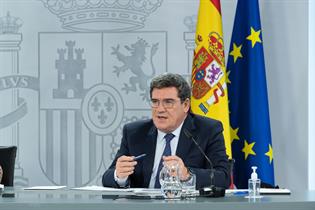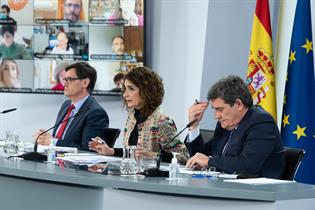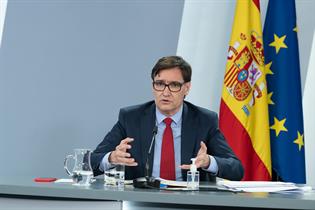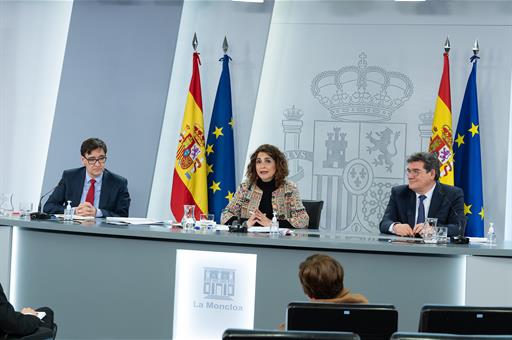Council of Ministers
Government extends Temporary Lay-off Plans to 31 May and raises pensions by 0.9%
Council of Ministers - 2021.1.26
Moncloa Palace, Madrid
The Council of Ministers approved a Royal Decree-Law designed to strengthen and consolidate social measures to defend jobs and the productive fabric, which includes the social agreement reached with the social stakeholders to extend Temporary Lay-off Plans (Spanish acronym: ERTEs) from 1 February to 31 May.
The Minister for Inclusion, Social Security and Migration, José Luis Escrivá, stressed that this new law can be characterised by its anticipation, given that the pact between the employers' organisations and trade unions has been very swift, which shows that the mechanism "is working very well".
The text, according to José Luis Escrivá, thus generates certainty because the ERTEs and the benefits to the self-employed are extended until 31 May, the last month in which the current state of emergency remains in force. It also simplifies the administrative procedure to move from one form of ERTE to another and comes through consensus.
The workers affected by an ERTE will maintain a benefit equivalent to 70% of the regulatory base. In addition, the clause to maintain jobs is renewed for a further six months.
José Luis Escrivá explained that, in order to protect the productive fabric, the three forms of ERTE approved in September are maintained. Sector and value chain ERTEs include up to an 85% exemption in company social security quotas. ERTEs on the impediment of activity due to administrative restrictions include up to a 100% exemption, while ERTEs on the limitation of activity have decreasing exemptions starting at 100%.
The minister summarised the development of the ERTEs since the start of the pandemic, highlighting that at the lowest point there were 3.6 million workers protected and that subsequently the figure has stabilised at around 700,000. He also stated that the impact on employment is much lower than in the 2008 financial crisis and the recovery much quicker than in other European countries.
Self-employed
 Foto: Pool Moncloa/Borja Puig de la BellacasaThe Royal Decree strengthens support for the self-employed until 31 May. The benefits for those whose activity has been suspended as a result of the decision by the administrative authorities will be compatible with income as employees of up to 1.25 times the minimum wage. José Luis Escrivá specified that protection will start at 760 euros.
Foto: Pool Moncloa/Borja Puig de la BellacasaThe Royal Decree strengthens support for the self-employed until 31 May. The benefits for those whose activity has been suspended as a result of the decision by the administrative authorities will be compatible with income as employees of up to 1.25 times the minimum wage. José Luis Escrivá specified that protection will start at 760 euros.
The benefit compatible with activity that has not been recovered or worsened leading to a drop in income is extended. The minister stated that the extraordinary minimum support for those on very low salaries will be 760 euros. He also announced that the benefit for seasonal workers will be at least 660 euros.
José Luis Escrivá also underlined that the self-employed have now passed the number of contributors before the pandemic. "There are now an additional 13,000".
Pensions raised
The Council of Ministers approved a 0.9% rise in contributory pensions and a 1.8% rise in non-contributory pensions.
The minister highlighted that the measures have a fiscal cost of around 1.5 billion euros and guarantee the purchasing power of almost 11 million pensioners.
José Luis Escrivá stated that this is the last time that pensions will be raised without a stable mechanism in place to ensure this. The government, he said, is finalising an agreement with the social stakeholders to establish a permanent mechanism to raise pensions. This decision will lead to a change in the General Social Security Act and have to be approved by Parliament.
The legislation on pensions prior to the 2011 reform is also maintained for those who lost their job in the financial crisis of that year and have not re-joined the job market and for those workers under an ERTE or subject to agreements reached before 1 April 2013.
The Minister for the Treasury and Government Spokesperson, María Jesús Montero, claimed that the government's commitment to pensioners is unequivocal and it is working tirelessly on the medium-term sustainability of the system. She also pointed out that the benefits paid out in 2021 respond to the government's political priority in relation to the elderly.
Extension to contracts and moratorium on property rentals
 Foto: Pool Moncloa/Borja Puig de la BellacasaMaría Jesús Montero explained that the government has extended until 9 May - the date of the end of the state of emergency - the possibility of applying for a moratorium or the partial write-off of property rentals when the owner has more than ten urban properties or is a public entity.
Foto: Pool Moncloa/Borja Puig de la BellacasaMaría Jesús Montero explained that the government has extended until 9 May - the date of the end of the state of emergency - the possibility of applying for a moratorium or the partial write-off of property rentals when the owner has more than ten urban properties or is a public entity.
The minister also specified that property rental contracts may also be extended under an extraordinary six-month extension until the same date under the same terms and conditions as the contract currently in force.
María Jesús Montero argued that these are pressing measures that are necessary to respond to the situation of those households in the situation of the greatest vulnerability as a result of the pandemic. The aim, she stressed, "is for no-one to be left behind", and for those people who need the greatest help to receive this from the public authorities.
Restrictions on mobility from United Kingdom
The Council of Ministers extended until 6 pm on 16 February the limitation on direct flights and passenger ships between the United Kingdom and Spain. Flights from airports in the UK to Spanish airports will only be permitted that exclusively carry Spanish and Andorran nationals, and residents in Spain or Andorra. This is also a requirement for the arrival of British vessels to Spanish ports.
The Minister for Health, Salvador Illa, explained that this measure is maintained to control the spread of the British variant of COVID-19. There are 195 confirmed and 161 suspected cases of this variant in Spain. Although these figures are less than 5% of all cases, Salvador Illa warned that we must pay close attention to its spread given that, as has happened in other European countries, this may have a dominant prevalence within a period of between six and eight weeks.
There is currently a cumulative incidence in Spain of 884 cases of coronavirus per 100,000 inhabitants, with 24% of hospital beds occupied and 40% of ICU beds. Given this "worrying backdrop", as the minister defined it, the positive aspect is that the seven-day cumulative incidence - 419 cases per 100,000 inhabitants, is on a downward trend that can be seen in seven autonomous regions. Record figures of diagnostic tests and the detection of cases have also been recorded, with more than 1.5 million in the last week - 3,400 per 100,000 inhabitants.
According to Salvador Illa, "the Response Plan that was successful in defeating the second wave will serve to defeat the third wave".
Compliance with Vaccination Strategy
 Foto: Pool Moncloa/Borja Puig de la BellacasaAs regards the Vaccination Strategy, the minister maintained the forecast that more than 80% of people in care homes and healthcare workers will have received the vaccine by the end of March, and that 70% of the population will have been vaccinated by the summer.
Foto: Pool Moncloa/Borja Puig de la BellacasaAs regards the Vaccination Strategy, the minister maintained the forecast that more than 80% of people in care homes and healthcare workers will have received the vaccine by the end of March, and that 70% of the population will have been vaccinated by the summer.
The minister recalled that it is necessary to strictly comply with prioritising the population groups undergoing the vaccination process and called on public servants and political leaders to "lead by example".
The figures on vaccine administration, which will be updated on Wednesday, show that more than 90% of the doses of the Pfizer-BioNTech and Moderna vaccines received have already been administered, specifically 1,237,593 doses. Almost 90,000 people have received the second dose of the Pfizer-BioNTech vaccine and are thus immunised.
At a European level, the minister reported that the Technical Committee of the European Medicines Agency has this week begun the procedure for the authorisation of the third vaccine - Astrazeneca - which Spain will receive doses of when approved. Salvador Illa backed the measures adopted by the European Commission to guarantee compliance with the delivery dates provided for in the contracts entered into with the different supplies.
Replacement of Minister for Health
Salvador Illa conveyed his final message as Minister for Health in light of his imminent departure, which will be announced on Tuesday afternoon by the President of the Government. "I am convinced, have no doubt about this, that we will manage to definitively eradicate this virus".
The minister undertook to continue working towards this goal and expressed his recognition of the regional health councillors and the members of the Lower and Upper House Health Committee, and thanked the Spanish people "for the exemplary compliance by most people with the measures adopted" and the healthcare workers "for their professionalism and vocation for service".
Non official translation





